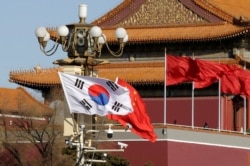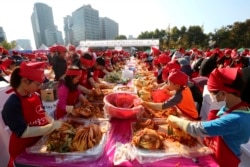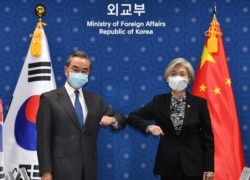For South Korean viewers, the “Joseon Exorcist” historical fantasy series seemed to have all the ingredients for a big budget television hit.
Set in the 15th century, the drama follows well-known historical figures in the royal family of Korea’s famed Joseon Dynasty who battle evil spirits in a fictional twist that plays into the zombie craze sweeping South Korean entertainment.
But when the series debuted last month, South Koreans weren’t impressed. Instead, many were incensed that Korean characters were shown drinking Chinese liquor and eating Chinese food, such as dumplings, mooncake pastries and preserved “century eggs.”
Outrage over the Chinese elements, along with other historical inaccuracies, quickly devolved into an advertiser boycott. The show, which had a $28 million budget, was canceled after just two episodes. The TV channel on which it appeared apologized for offending the Korean people.
The incident reflects growing animosity toward what many South Koreans feel is inappropriate Chinese influence in South Korean entertainment, as well as a manipulation of history in order to claim several beloved aspects of Korean culture.
Recent months have also seen eruptions of nationalist-tinged anger over Chinese media claims that kimchi, a fermented cabbage dish ubiquitous in Korea, originated in China.
Underpinning the tensions are wider concerns about China’s growing economic and military strength, and its more combative stance toward its neighbors, which analysts say is an attempt to reassert Beijing’s position as a dominant regional power.
But China's so-called “wolf warrior” approach to diplomacy is alienating South Koreans at an alarming pace. According to a pair of recent opinion polls, South Korean perceptions of China are now roughly equal to views about Japan, Korea’s former colonial ruler.
How it all went wrong
It wasn’t always this bad. In 2015, only 37% of South Koreans had a negative view of China, according to data from the Pew Research Center. By 2020, that figure had more than doubled to 75%.
South Korea-China ties especially deteriorated after 2017, when Seoul installed the Terminal High Altitude Area Defense (THAAD) U.S. missile defense system to counter the threat posed by North Korea. Beijing objected to the deployment of the THAAD anti-missile system, since its radar can see deep into China.
In response, China waged a painful campaign of economic retaliation. Chinese tour groups halted trips to South Korea. Stores in China belonging to Lotte, the South Korean conglomerate that provided the land for the THAAD system, were shut down after they failed to receive regulatory approval.
South Korea’s K-pop musicians, wildly popular among Chinese, had their tours canceled and have since been unable to hold concerts in mainland China.
According to some estimates, the dispute cost South Korea billions of dollars. Many analysts say it also marked a turning point for South Korean perceptions of China.
“THAAD came in and everything changed,” says Kim Jiyoon, a Seoul-based political scientist and commentator who specializes in public opinion analysis.
Kimchi battle
But South Korea-China tensions only recently became more emotional, especially after kimchi entered the cultural battleground.
The controversy began when the ISO, a global industry regulator based in Sweden, posted new standards for the production of paocai, a Chinese dish made of fermented vegetables.
The Global Times, a provocative and nationalistic Chinese state newspaper, boasted that the new certification proved China had set the industry benchmark for pacoai, which it said also included kimchi.
Many experts noted paocai and kimchi are not the same dish. But the notion that China had created the authoritative version of kimchi was still highly offensive to many Koreans, who serve kimchi with nearly every meal and see it as a national dish.
Creating enemies
The kimchi incident was an example of China’s “wolf warriors” scoring an own goal, according to Peter Charles of Australia’s Lowy Institute.
“By picking a wholly unnecessary fight on a topic with no diplomatic stakes, Beijing has only further damaged its reputation with the South Korean population and made life more complicated for counterparts in Seoul who are otherwise eager to cooperate with China,” wrote Charles.
Kim Joon-hyung, chancellor of the Korea National Diplomatic Academy, which trains South Korean diplomats, told VOA he was puzzled by Beijing's moves.
“You cannot be a global leader if you behave this way,” Kim said. “The manipulation of history — they think kimchi is their food — things like that.”
“I have a lot of friends in China, believe me. I actually advise them: don’t do that. You have a rich history and can have your own soft power. Why are you so into this narrow-minded [approach]?” he added.
But as is the case for many countries, diplomacy is not always about making friends.
“Sometimes being feared is also very important,” says Dali Yang, a China specialist and professor at the University of Chicago.
Many analysts say China’s more aggressive demeanor is an attempt to restore its old stature, following a “century of humiliation” when it was subjugated by Western and Japanese powers.
“Clearly this is where President Xi [Jinping] has played a big role in terms of this willingness to fight,” says Yang. A newly powerful China, he says, wants to signal to its adversaries and rivals that it is willing to sustain losses in order to achieve its goals.
Seoul stuck in the middle
But is South Korea a friend or rival of China? It’s complicated, thanks in large part to a history that saw the two countries fight on different sides of the 1950s Korean War.
Beijing and Seoul established diplomatic ties in 1992. Since then, relations have been mostly stable, even though China remains allied with North Korea and South Korea remains a treaty ally of the United States.
With China now the world’s second-largest economy, South Korea is in an awkward position: not only does it host nearly 30,000 U.S. troops, it also depends economically on Washington’s main rival, which is right next door.
But if it comes to choosing between the two, many South Koreans clearly prefer the United States, says Kim Jiyoon, the public opinion researcher, who notes the alliance is as old as South Korea itself.
“We don’t really have any emotional or psychological attachment with China, but we do have that with the U.S.,” she says. “Sometimes it has been bumpy and thorny but still it has been a 70-year alliance. We’ve been together and we know what our enemy is, what our goal is, and we share democratic values.”
But there is an increasing disconnect between the opinion of the South Korean public and its government, which is careful not to upset relations with Beijing, Kim says.
In particular, South Korean President Moon Jae-in has been reluctant to become involved in U.S. efforts to explicitly counter China, such as the Quadrilateral Security Dialogue regional grouping.
Uncertain future
Though China still occasionally expresses its opposition to the THAAD missile system, there have been signs that diplomatic ties may improve ahead of a possible visit to South Korea by China’s Xi.
Some reports even indicate China may soon lift its informal ban on South Korean film and TV shows. Such a move would likely be welcomed by the vast number of Chinese fans of South Korean entertainment.
But if recent controversies are any indication, it may be longer before many South Koreans are comfortable with seeing Chinese content dominate their own screens.
Lee Juhyun contributed to this report.







